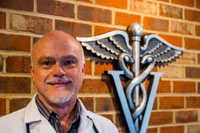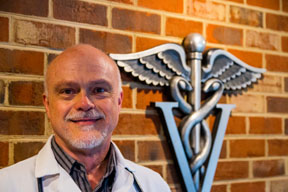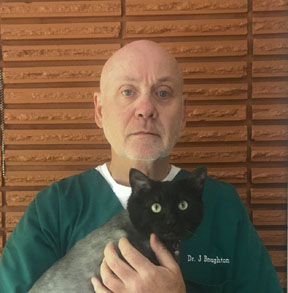
Paul Gustafson 288

Photo courtesy of Dr. Paul Gustafson
Surging business has led to changes in payment policies at some private veterinary clinics, including Dr. Paul Gustafson's practice in Newport News, Virginia.
Dr. Sara Thornton was getting so tired of all the no-shows that she started doing something she'd never dared do before. Since July 13, she's been asking new clients to pay $50 upfront for the privilege of booking a visit with Schuylkill Veterinary Hospital in Pottsville, Pennsylvania.
A few clients balked at the idea and refused, but the gap they left was easily filled by others happy to produce the cash while making an appointment. "It seems to have solved the no-show problem and we still have a full book," Thornton told the VIN News Service.
Midtown Animal Hospital in Sacramento, California, also has taken the pre-pay plunge, according to its medical director, Dr. Katie True. The practice has been booked so far out that it began limiting new clients to one per day, as well as charging a $100 deposit on surgeries. "It crushes us when [a client] 'no-shows' and we have such a long waiting list," True posted on a message board of the Veterinary Information Network, an online community for the profession.
Thornton and True were among five veterinarians to post on VIN recently to say that their clinics and hospitals have started charging at least some clients in advance of their appointments. The practice indicates that veterinarians are exploring new ways of doing business in the wake of the COVID-19 crisis. The pandemic has shrunk the number of patients they can see in a day because of time-consuming cleaning and social distancing protocols. In some cases, practices also have been short-staffed due to recent layoffs, employees burning out and quitting, or colleagues contracting the disease.
Now, in a more recent twist, the pandemic is driving a surge in demand at many practices in the U.S. and beyond.
"We have been crazy busy in June, July and August; among the best-ever for those months," Dr. Paul Gustafson, a veterinarian at Warwick Animal Hospital in Newport News, Virginia, said in an interview.
Gustafson's practice recently started requiring all new clients to pay for exams in advance. The fee is refundable if they cancel at least 24 hours before their appointment. New clients who prefer not to pre-pay may arrive without an appointment and hope a slot emerges. "Surprisingly, clients don't seem to mind, and we're getting twice as many new clients per month as we were before the virus hit," he said.
Other ways of managing no-shows include calculating how often they occur and double-booking accordingly. But some practitioners, including Thornton, say they don't want to risk being overstretched with a double-booking when a good client shows up on time.
Pets take center stage during pandemic
Nobody is sure exactly why business is picking up strongly for many practices at a time when so many families are under financial strain and seemingly less able to afford veterinary care. One obvious explanation is that a backlog of work is being cleared, now that lockdowns have eased in various states and restrictions on elective surgeries have been lifted. There also have been numerous reports that adoptions of dogs and cats spiked during lockdown.
Gustafson has heard that some regions may be faring better than others in demand for veterinary care. "The practice management company we use told me in other areas where the virus is in the second or third wave that business has dropped off dramatically," he said. "We're not there yet, thankfully."
James Broughton 288

Photo courtesy of Dr. James Broughton
Revenue hit a record high in July at Exclusively Cats Veterinary Hospital in Winnepeg, Manitoba, according to its owner, Dr. James Broughton, shown with Ronald, the clinic cat.
For her part, Thornton posits that people working from home are finding they have more time to visit a veterinarian. In agreement is Dr. James Broughton, owner of Exclusively Cats Veterinary Hospital in the Canadian city of Winnipeg, Manitoba. He saw revenue at his practice slump in April and May, then bounce back strongly in June and July, with July being a record for that month over the past 12 years. Revenue in August rose a little more modestly but it was still his third-best August ever. "We are very busy right now," he told VIN News.
Broughton reckons that many people isolating during the early stages of the pandemic are now arranging for services they had put off in April and May, including wellness exams and non-emergency surgeries. "Also, I think that with a lot of people working from home, they are noticing things about their pets they may not have before," he said.
Recently, for instance, Broughton said a woman brought her cat in because it was drinking water excessively. It turned out to have chronic renal insufficiency. "She admitted to me that with two other cats and a dog, she never would have noticed this if all she was relying on was how often she refilled the water bowl," he said. "Being at home, she noticed this particular cat was going to drink much more than the others."
Broughton, too, recently started requiring new clients to pre-pay the exam fee at the time of booking. The money is refunded if they cancel at least 48 hours prior to their appointment. "Most clients understand and are willing to provide the deposit," he said. "We have also had a couple cancel and receive their refund, but this gave us enough time to fill that slot with another patient."
Will demand for veterinary care continue to soar?
The notion that veterinarians are run off their feet is supported by survey results and some corporate earnings updates. VetSuccess, which tracks financial data from more than 2,900 clinics in 32 U.S. states, estimates average revenue during August was up around 19% compared with August 2019.
Even in Australian towns recently ravaged by historic wildfires, veterinarians have told of a pandemic-led jump in demand.
Pets at Home, which is one of the world's biggest publicly traded veterinary companies, with 450 practices in the United Kingdom, thinks the good times could be here to stay, as the pandemic prompts what it calls a "structural change" in work and leisure activities.
Pets at Home shares jumped 21% on July 31 and have largely held their ground since, after the company released an update showing revenue roaring back after lockdown measures were eased in Britain.
"Pets always need love, care and attention and the COVID-19 lockdown has really highlighted the position of pets at the heart of the family or as dearly-loved companions," Gillian Hammond, Pets at Home's head of media and corporate affairs, told VIN News. "Pets have been a great source of comfort to their owners and for some, have been the sole source of companionship. This has only increased with the adoption of widespread remote-working practices and changes in leisure activities as lockdown restrictions are lifted."
Hammond said the company's internal research indicates that nearly nine out of 10 British pet owners would cut back on other family expenditures before reducing spending on their pet. "Together, this points to the resilience of the pet care market," she said.
Large American corporate consolidators, including Mars, National Veterinary Associates, Pathway Vet Alliance, VetCor, Blue River and Compassion First aren't listed publicly and don't have to disclose their financials publicly. Each declined to comment for this article or did not reply to requests for comment.
Employment statistics support the notion that American pets could be getting more attention from owners compelled to stay home with them during the pandemic.
In August, 24.3% of employed Americans teleworked because of the coronavirus, according to the U.S. Bureau of Labor Statistics (BLS); the figure was 26.4% percent in July. Research conducted in May by the Stanford University Institute for Economic Policy Research found that 42% of the U.S. labor force was working from home full-time.
Before the pandemic hit, just 7% of private-industry workers had access to a "flexible workplace" benefit. The figure was even lower, 4%, for state and local government employees, according to the BLS's 2019 National Compensation Survey.
To the extent that telecommuting supports pet ownership and more frequent veterinary visits, the end of the pandemic won't necessarily end the trend, as businesses come to recognize long-term benefits of remote work, such as saving on office expenses. The anticipated share of working days at home is set to triple after the pandemic — rising from 5.5% to 16.6% of all working days, according to results of a survey of nearly 300 companies conducted in May by the Federal Reserve Bank of Atlanta, Stanford University and the University of Chicago. Respondents also anticipated that 10% of their full-time workforce will be working from home five days a week.
Not everyone, though, expects the current rush of business to veterinary practices to last forever, nor the need to charge clients upfront. "I feel that just like the earlier downward trend, this upswing will level off as our lives return to normal over the next several months," Broughton said. "I think it will just depend on how long this current situation lasts for and how soon they develop an effective vaccine so our lives can resume some normalcy."